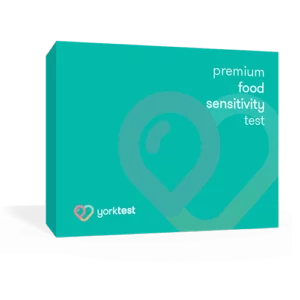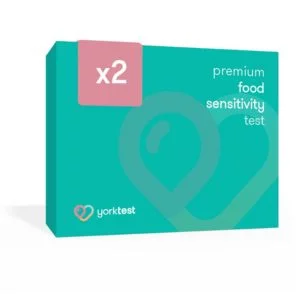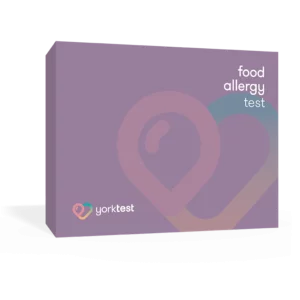- What is a Carrot Allergy?
- Common Carrot Allergy Symptoms
- Carrot Allergy vs. Carrot Sensitivity
- How to Test for a Carrot Allergy
- Skin Prick Test
- Blood Test
- Elimination Diet
- Note on Oral Allergy Syndrome Testing
- Foods to Avoid
- Prevention & Treatment for Carrot Allergy
- Test for Carrot Allergy or Sensitivity with YorkTest
A carrot allergy is relatively uncommon – despite the fact that carrots rank in the top ten vegetables consumed worldwide. But this allergy can cause distressing symptoms in affected adults and children.
Identifying an allergy to carrots can be particularly difficult as there’s considerable overlap with Pollen Food Allergy Syndrome (PFAS), also known as Oral Allergy Syndrome (OAS). OAS is a contact allergic reaction triggered by raw fruit or vegetables coming into contact with the mouth or throat. If you suspect you have a more complex allergy syndrome, then you should seek medical advice from your primary care physician or an allergist.
However, if you think that carrots specifically are the culprit behind your suspected allergic reaction then this guide can help. We’ll outline the symptoms of a carrot allergy, highlight other cross-reactive foods you should be mindful of consuming and ways to test, manage, and prevent a carrot allergy from disrupting your life.
What is a Carrot Allergy?
A carrot allergy is an adverse immune response to specific proteins found in carrots. Unlike carrot sensitivity or intolerance, this allergic response occurs because the immune system overreacts to specific proteins found in carrots, thereby producing antibodies called Immunoglobulin E (IgE), otherwise known as an IgE-mediated food allergy.
An allergic reaction can be triggered by the direct consumption of carrots or exposure to products containing carrot-derived ingredients. Carrots are more likely to cause allergic reactions when eaten raw than when cooked, as cooking unravels the allergenic proteins in carrots and lessens their severity on the immune system.
Common Carrot Allergy Symptoms
Individuals with a carrot allergy may experience various symptoms, ranging from mild to severe. These reactions can occur within minutes or up to several hours after consuming carrots or foods containing them. Common symptoms of a carrot allergy include:
- Itchy mouth, tongue, lips, ears, or throat
- Swelling in the mouth area
- Scratchy feeling in the throat
- Hives
- Breathing problems
- Swollen skin
- Cough
- Sore throat
- Sneezing
- Runny nose
- Tightness in the chest
The most frequently reported symptoms are related to oral allergy syndrome, but other symptoms can include angioedema, urticaria, dyspnea, vertigo, and tightness of the throat. A person with a severe allergy to carrots can encounter a serious reaction that includes a combination of these symptoms, especially if they have come into contact with the raw vegetable.
In rare but extreme cases, an individual may experience symptoms of anaphylaxis, which is characterized by low blood pressure, rapid heartbeat, closing of the throat, or difficulty breathing. Emergency medical attention should be sought immediately in such cases.
In some cases, carrot allergy can cause gastrointestinal food intolerance symptoms in people who are sensitive to salicylates. Salicylates, which are naturally occurring compounds derived from salicylic acid found in plants, can cause sensitivities, allergies, and swelling of different organs in some people, particularly those with asthma, aspirin sensitivity, or nasal polyps.
Carrot Allergy vs. Carrot Sensitivity
Whilst a carrot allergy is relatively rare, it’s estimated that around 45% of Americans have some kind of food sensitivity, and this can include a sensitivity to carrots!
Understanding the difference between an allergy and intolerance is key for managing symptoms and adapting your diet. While both conditions can cause life-altering discomfort, they involve different bodily responses.
Here are some of the key differences to remember:
- A carrot allergy elicits an IgE antibody immune response whereas a carrot sensitivity triggers an IgG antibody response
- Symptoms of an allergic reaction can begin immediately, or shortly after, contact with a trigger allergen. On the other hand, symptoms of carrot sensitivity can take several hours, or even days, to appear.
- The typical profile of symptoms differs. Whilst a carrot allergy is linked to swelling, itching and sneezing, a carrot sensitivity is more likely to trigger symptoms such as:
- Diarrhea
- Bloating
- Skin conditions e.g. eczema or psoriasis
- Headaches
- Fatigue
If you’re experiencing any of the symptoms on the list above, we recommend taking a Premium Food Sensitivity Test to see whether carrots are triggering an IgG reaction in your body.
Sensitivities are more common, but the good news is they are also less severe. If you have a carrot allergy, then it’s recommended that you avoid that food for the rest of your life. With carrot sensitivity, you may be able to reintroduce carrots to your diet after an elimination diet and under the advice of a nutrition professional.
How to Test for a Carrot Allergy
If you suspect that you may have a carrot allergy, you can make an appointment to consult with an allergist. You can also try an at-home allergy test kit to help determine whether or not you have an IgE reaction to carrots. Depending on which avenue you take, there are several tests available for diagnosing food allergies, including those specific to carrots.
Skin Prick Test
A skin prick test involves placing a small amount of carrot extract on the skin and then pricking the surface with a needle, this is performed by a primary care physician or an allergist. If an inflammatory response, like puffiness or inflammation, is seen at the site of application, this could suggest a carrot sensitivity.
Blood Test
A blood test can measure the amount of immunoglobulin E (IgE) allergen-specific antibodies in a blood sample to detect an allergy to carrots. Elevated levels of IgE antibodies may suggest a carrot allergy. What’s convenient about food allergy blood tests is that they often come in the form of a finger-prick blood test, which can be conducted from the comfort of one’s home.
Elimination Diet
An elimination diet involves ceasing all consumption of carrots and cross-reactive birch pollen foods, and slowly introducing these foods back into the diet with close monitoring of one’s symptoms.
The major pitfall is that an elimination diet alone can’t differentiate between an allergy and an intolerance. If someone has an allergy to carrot, or any other food, then re-introducing that food into their diet could be dangerous.
Note on Oral Allergy Syndrome Testing
Suppose your symptoms seem related specifically to raw carrots but improve upon cooking them. In that case, it might be indicative of oral allergy syndrome, which occurs due to cross-reactivity via birch pollen. Both skin prick tests and blood tests are generally recommended to properly diagnose this condition.
It is crucial to remember that self-diagnosing a carrot allergy or any other food allergy should be done with the oversight or consultation of a qualified healthcare professional. If you do properly diagnose an allergy to carrots, seek professional medical advice prior to making major dietary modifications or taking medications for suspected allergies.
Foods to Avoid
When you have a carrot allergy, it’s essential to know which foods may contain carrots or trigger similar allergic reactions. Here is a list of common foods and ingredients that should be avoided:
- Carrots: Raw, cooked, or processed in any form (e.g., juices, soups, cakes).
- Birch pollen-related fruits and vegetables: Due to cross-reactivity with birch pollen proteins, some individuals may also react to apples, pears, peaches, plums, hazelnut, kiwi, and cherries. Additionally, celery and parsley can trigger oral allergy syndrome.
- Mixed vegetable dishes: Be cautious when consuming mixed vegetable dishes such as stir-fries or salads since they often include carrots.
- Supplements containing beta carotene: Beta carotene is found naturally in carrots and other orange-colored fruits and vegetables. It can also be used as a dye in certain orange-colored foods and beverages. Some vitamin supplements use this compound for its antioxidant properties; always check the label before consumption.
In addition to these specific items mentioned above, here are some general guidelines on how you can avoid symptoms caused by your carrot allergy:
- Avoid pre-packaged meals that might contain hidden sources of carrots like sauces or seasonings.
- Carefully read food labels while shopping at grocery stores. Look out for terms like ‘carrot extract’ or ‘natural flavoring.’
- When dining out, inform the restaurant staff about your allergy and ask for dishes without carrots or cross-contaminated ingredients.
It’s essential to be vigilant when avoiding foods that may trigger a carrot allergy. Be alert and conscious of potential allergens in multiple items to greatly reduce the likelihood of an allergic response.
It is vital to recognize packaged foods that may trigger an allergic reaction to carrots, and it’s prudent to seek advice from an allergist or nutrition expert for additional information.
Prevention & Treatment for Carrot Allergy
Managing a carrot allergy primarily involves avoiding carrots and foods containing them. In some situations, medical attention may be required to alleviate or avert extreme responses. Here are some prevention tips and treatment options for those with a carrot allergy:
- Antihistamines: Over-the-counter antihistamines can help relieve mild allergic reactions such as itching, hives, and swelling. These medications work by blocking the release of histamine, which is responsible for many allergy symptoms.
- Dietary Modifications & Nutrition Counseling: A registered dietitian can provide guidance on how to maintain a balanced diet while avoiding carrots and other potential cross-reactive foods rich in beta-carotene. They can also suggest alternative sources of nutrients commonly found in carrots, such as vitamin A and potassium.
- EpiPen (Epinephrine Autoinjector): In extreme cases of anaphylaxis—a severe allergic reaction that can be life-threatening—individuals should carry an EpiPen at all times. This device delivers a dose of epinephrine to counteract the effects of anaphylaxis quickly. Consult your healthcare provider about obtaining an EpiPen if you have a history of severe allergic reactions.
It is essential to consult with a healthcare professional before starting any treatment for a carrot allergy. Your doctor will help you determine the best course of action based on your specific symptoms and medical history.
Test for Carrot Allergy or Sensitivity with YorkTest
YorkTest specializes in home to laboratory food sensitivity and allergy tests which assess how a person’s immune system reacts to specific foods and drinks.
- Premium Food Sensitivity Test is ideal for adults 18+. The test analyzes an individual’s IgG reactivity to 200 foods and drinks, including carrots.
- Junior Food Sensitivity Test is ideal for kids aged 2-17. It also analyzes IgG reactions but has been designed to better suit children’s diets.
- Food Allergy Test is suitable for anyone aged 18+. The test analyzes an individual’s IgE reactivity to 23 foods, as well as 18 common environmental allergens.
To take any test, you can order a kit online – which is then mailed to you within a few days. After collecting a blood sample, you can send it back to YorkTest for free, where it’s analyzed in our accredited laboratory.








